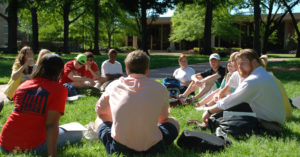Snag a seat!
Graduate students and advanced undergraduates at the University of Kentucky, watch this VIDEO (4m29s) about why you should take my EPE 525 / 640 course in the fall of 2020 on the Philosophy of Education. The EPE 525 course is the undergraduate version of the EPE 640 class, which is for graduate students, and both meet at the same time and in the same room.
Why study the Philosophy of Education?
 a) Educators and leaders are expected to have a meaningful grasp of their own philosophies of education;
a) Educators and leaders are expected to have a meaningful grasp of their own philosophies of education;
b) All research is rooted in frameworks of ideas that support and contextualize our work and thought, and that can clarify and help us to focus or be conflicted and confuse us if not carefully considered;
c) Everyone working in educational administration contributes to a system that functions with respect to or in conflict with underlying philosophical ideas. That calls for appreciating and always keeping in mind what we ought to be doing in education.
What you’ll get out of it / create:
1) A short “teaching statement,” “Statement on Educational Philosophy,” or related document commonly requested in academic job applications, as well as for administrative positions that often involve teaching courses or otherwise supporting them;
2) A book review for possible publication (optional route for students’ presentation);
3) A conference-length paper ready for submission to professional calls for papers;
4) A full-length research paper suitable for submission to journals and that could support your other projects;
5) An op-ed-length version of the research paper for possible submission to newspapers or educational periodicals (optional);
6) Credits that can contribute to the Graduate Certificate in College Teaching and Learning.
When & Where?
It’ll be on Mondays from 4-6:30pm in Dickey Hall rm 127. It is possible that we may start the semester with online meetings via Zoom, but details on such arrangements are yet to be determined. Decisions will follow the University of Kentucky’s guidelines for the sake of safety in the midst or wake of the COVID-19 pandemic.
Former Students’ Success
 In Fall 2019, 3 of 6 grad students in my EPE 640 class submitted their papers to conferences and had them accepted for presentation. They included: Joseph Barry and Josh Smith presented their papers at the 2020 Southeastern Philosophy of Education Society conference at the University of Georgia in February 2020. Also, Samer Jan had his paper accepted for presentation at the 2020 conference of the Society for Philosophy in the Contemporary World. Josh Smith also will be publishing his book review of Teaching In the Now by Jeff Frank in Columbia University’s Teachers College Record. The photo on right features Weber with two students from his Spring 2019 Ethics and Educational Decision Making course, Andrew Nelson and Maria Richie, whose papers from that class were accepted for presentation at the 2019 Midwest Educational Research Association conference.
In Fall 2019, 3 of 6 grad students in my EPE 640 class submitted their papers to conferences and had them accepted for presentation. They included: Joseph Barry and Josh Smith presented their papers at the 2020 Southeastern Philosophy of Education Society conference at the University of Georgia in February 2020. Also, Samer Jan had his paper accepted for presentation at the 2020 conference of the Society for Philosophy in the Contemporary World. Josh Smith also will be publishing his book review of Teaching In the Now by Jeff Frank in Columbia University’s Teachers College Record. The photo on right features Weber with two students from his Spring 2019 Ethics and Educational Decision Making course, Andrew Nelson and Maria Richie, whose papers from that class were accepted for presentation at the 2019 Midwest Educational Research Association conference.
Questions? Email me at eric.t.weber@uky.edu. You can also connect with me on Facebook, Twitter, LinkedIn, & Academia.edu.
The post [VIDEO]: You Should Study the ‘Philosophy of Education’ (EPE525/640) in Fall 2020 first appeared on Eric Thomas Weber.





